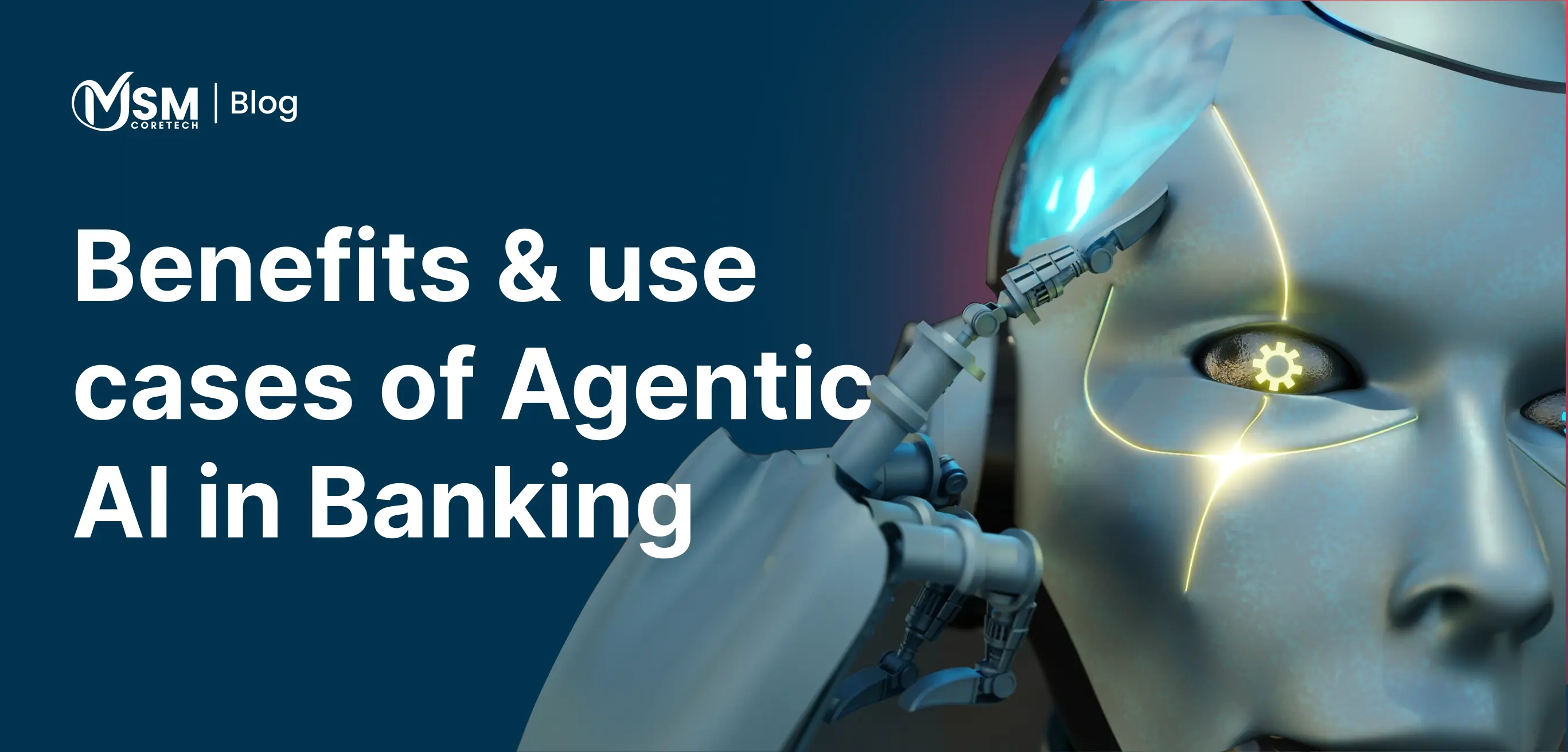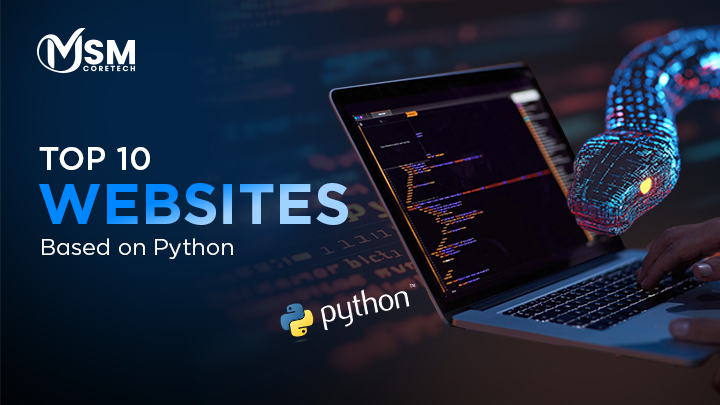Agentic AI in Banking | Transforming Financial Services with Intelligent Automation

Agentic AI in the banking sector means a self-sufficient artificial intelligence classification that is developed to attain goals and purposes with the help of scheduling and thoughtful decision-making, with minimal human involvement. Agentic AI benefits in nurturing innovation in the banking area with robotic systems to reach certain goals, contrasting traditional LLMs and AI models to process data and information.
The banking industry is compatible with this technology due to its composite operational structures, large data sets, and the need to provide to consumers in a tailored manner. Agentic AI use in banking is not just a virtual subordinate; it helps in the supervisory process for the whole banking industry.
This approach utilizes huge language representations as their intelligence to analyze the commands, interconnect with additional related tools and data, and influence different workflows to resolve complex events by learning from their working style. This blog objects to discover how Agentic AI in banking offers assistance with no time breaks, real-time data safety services, and how it mechanizes operations to achieve more productivity.
Visualizing a bank that never breaks its functioning and forecasts fraudulent activities before time, offers elegant and customized services according to user preferences, and can adjust situations according to their needs.
Moreover, for banks to familiarize with Agentic AI is no longer connected to cost effectiveness and achieving operational effectiveness; it is merely important to stay competitive and updated in this digital transformation era.
What is Agentic AI?
Agentic AI refers to a new-age artificial intelligence mechanism that is beyond traditional predictive and automation processes. Unlike traditional AI systems, which have slow responses to the prompts, it works only with pre-programmed tasks. Agentic AI in banking leverages processes like automation, laying goal-oriented objectives that help in planning, deciding, and executing actions for achieving the desired goal with very little human involvement.
The distinctive function of Agentic AI is its agency, which helps it to analyze problems, offer real-world AI-powered banking solutions, and refine its strategies as the environment changes. The transformation of smart virtual assistants is the main factor in reshaping the artificial industry. By offering adaptability, autonomy, and a collaborative nature, Agentic AI is the best fit for the financial sector.
For instance, a traditional AI mechanism can only help customers to single-prompt such a balance inquiry; Agentic AI can answer different types of prompts at a time by analyzing the situation, initiating necessary checks, sending confirmations, and updating the records without needing any human input.
Key Features of Agentic AI-
- Goal-oriented in nature - Agentic AI is designed with a clear set of goals and possesses the ability to plan strategically, adjusting its nature according to the situation required.
- Environmental contact and tool use – Agentic AI constantly monitors its environment and retrieves data from external sources such as databases, and uses this information for performing tasks like boosting API calls.
- Autonomy – These systems can operate independently, leveraging their own decisions to achieve goals with any human input. It also automates certain daily tasks without any effort or prompting. It generally requires one-time direction, which is very different from traditional AI tools.
- Learning and adaptation – Unlike traditional AI models, Agentic AI aims to learn from past user data and preferences and offer personalized banking services according to them, which builds a long-term consumer relationship.
- Decision transparency and explainability – One of the major advancements is that these tools can explain their information and processing. This is necessary in the baking industry, where transparency is not adjustable.
Lastly, Agentic AI reflects the dynamic evolution from smart techniques to intelligent mechanisms, making it a comfortable fit for the banking sector, in which consumer expectations are very high and complex.
Why Does the Banking Sector Need Agentic AI?
The banking sector needs Agentic AI in banking to expand beyond traditional mechanisms for automating the process to develop a fully automated system, such as executing workflows, analyzing real-time data, and providing a user experience by offering personalized banking advice. It also helps in transforming and refining operational efficiency by leveraging functions like automatic fraud detection, a smart risk management system with proactive monitoring and action.
Agentic AI also increased resilience and revenue systems by acknowledging consumer financial gaps, which makes it an important factor for the banking sector. Beyond efficiency, these tools offer future predictions and resilience for the organization. The significant rise in Fintech in the banking industry, Agentic AI helps banks stay competitive by innovating new AI powered banking solutions faster than old AI tools.
AI bots can independently plan, execute complex tasks, and attain the desired goals, unlocking possibilities across several banking procedures, including functions like treasury management, credit underwriting, and fraud analysis. The innovation and implementation of Agentic AI is an evolution of automation in the financial sector.
Current Pain Points –
- Improves compliance monitoring – Agentic AI systems can continuously monitor transactions, identify any suspicious activity, and perform audits to reduce the need for manual monitoring.
- Basis for modernization – Implementing Agentic AI helps in encouraging the embracing of new modern infrastructure, which is necessary for enabling AI’s possible potential in the baking industry.
- Decreased Human interference – The system’s ability to develop informed decisions and automating tasks helps employees to work on other things that cannot be done through technology, which frees their time and mind a lot to stay motivated.
- Legacy bottlenecks – The Majority of banks are relying on outdated and traditional AI systems, which makes operations very difficult. Agentic AI can help and fill this gap by automating regular tasks and the easy implementation of new digital technologies.
- Regulatory and governance pressure - Regulations are changes in significant intervals, making manual processes error-prone and more costly. Agentic AI can adapt to new conditions very fast with constant compliance monitoring.
Benefits of Agentic AI in the Banking Sector –
With the help of AI-powered automation in finance for repetitive tasks, Agentic AI has transformed the baking industry's working structure. By implementing intelligent systems, banks can identify new revenue streams with the help of data-driven analysis for new product innovation.
Agentic AI aims to enhance operational efficiency and regulatory compliance by developing audit reports and adapting to new and latest legal compliance to lessen the effect of risk occurrence. Agentic AI does not replace human beings; rather than it empowers them and offers them free time to innovate and find AI powered banking solutions to the problems by automating the relevant tasks.
AI-driven insights help banks in fostering reactive operations for active strategies, leveraging them to identify potential risks, emerging market opportunities, and deliver a unified experience to create user loyalty.
- Operational efficiency – For finance sector employees, Agentic AI helps in reducing the chances of delays, lowering risk possibilities, and empowering decision-making by analyzing the data environment.
- Cost optimization – Industry data reflects that 36% of the financial sector employees have admitted that AI reduces the overall annual cost by 10%. This system enhances this process further by applying real-time fraud detection methods by displacing 80% of the workforce involvement in critical workflows.
- Fraud prevention and Risk management – Agentic AI improves banks’ fraud detection mechanisms by offering real-time data analysis, deep examination of doubtful activities, with proactive monitoring. Risk management offers regular monitoring and comprehensive audit checks with the help of predictive banking services analysis and less human intervention.
- Always-on service – Agentic AI offers 24/7 service without any downtime, combining to handle everything from routine tasks to uncertain challenges. This helps in ensuring a seamless experience, which helps in building strong customer relationships and loyalty.
- Open banking and environmental integration – Agentic AI can collaborate with external APIs, third-party applications to offer integrated monetary services, which allows banks to act as ecosystem players rather than an institution.
Key Agentic AI Use Cases in the Banking Sector –
Beyond traditional AI applications, like compliance and fraud detection, Agentic AI plays a vital role in leveraging predictive banking models. By examining macroeconomic factors and behavioral patterns, AI models can analyze ongoing trends in consumer demand, such as the growing need for personal automated loans during occasional times. This predictive banking model’s nature helps banks in offering customized product offerings and stay beyond of consumer needs and expectations.
- Personalized customer service – AI chatbots can act as personal financial advisors, manage their accounts, and solve issues like overdraft errors and credit mismanagement.
- Improvised operations - Agentic AI helps in enhancing operational efficiency by automating functions like expense management, document processing, and other repetitive tasks, such as balance enquiry.
- Governing compliance and reporting – AI agents can identify potential threats and data breaches to ensure transparency by automating compliance with general guidelines.
- Loan and credit processing – AI agents can foster the documentation process by analyzing users' credit reports by verifying his/her income level with quick decisions, offering and reducing the wait times in approval.
- Automated trading and portfolio management- Agentic AI bots help users to put on automated trade options by executing trades, balancing the portfolio by analyzing real-time data of the market to get optimized returns.
Challenges and Considerations
While Agentic AI offers a transformative approach, it has significant challenges. One of the major challenges is to address concerns related to data security and privacy. Banks aim to secure important consumer data and financial information with the help of autonomous systems like Agentic AI, which raises the risks of misuse, data breaches if the data is not properly secured.
Agentic AI models can also harness the growth and struggle in understating complex situations, as these models have large language inputs to generate greater responses, it may face significant challenges when it comes to develop answers in consideration with emotional intelligence and moral perceptive.
Integration with legal systems is also acting as a major barrier, as several banking institutions use an old infrastructure, making it hard to establish new AI models.
By setting pre-defined goals and KPIs banks can allocate their resources effectively, and working for improvising background operations to develop a growth roadmap aligning with the goals and objectives needed to be achieved.
Future Outlook
The future direction of Agentic AI in the banking sector is very good, as with the help of these innovations the financial industry has faced a drastic change offering several benefits. With increasing consumer demand for personalization, speed, and all-time availability, banks will need Agentic AI to provide a seamless user experience.
In recent years, innovations in generative AI, real-time analysis will make Agentic AI integrate with the entire technological ecosystem. It aims to offer services like wealth management, profound investments across various industries.
Moreover, the success and growth of this innovation depend on its proper implementation and use. Financial institutions must find a gap between the use of AI and human involvement in it, by which both systems work productively.
A new Agentic AI feature is expected to be introduced soon which will include a core set of AI agents taking up roles such as consumer support, inventory management and sales innovation and development, whereas human workforce will be needed to train these models constantly and coordinate with them.
Deloitte predicted that by the year 2027, 50% of the businesses using generative AI will deploy Agentic AI, increasing 25% from the current year.
Conclusion
Agentic AI is the start of a technologically ready world, and as it is a foundation of innovation in financial sectors, where autonomy, intelligence adaptation, and developing new and smarter systems are necessary to build long-term consumer relationships.
System integrators play key roles in attaining the vision. As banks are shifting from small pilot activities to scale functioning, System integrators help in embedding AI agents into real projects without breaking the working structure.
As banks change their preferences from a reactive approach to a proactive approach, the integration of Agentic AI will be the main strategy for developing new strategies and innovations, and fostering long-term. Organisations that adapt this shift, balancing AI automation in finance with transparency, will help in shaping the future of technological advances and AI.
Agentic AI is developing its roots across the banking value-chain and as capabilities will mature, different applications in the area will develop each with its own layer and outcomes.
Related Blogs

Website Development Cost in USA
Explore website development cost in USA for 2026. Learn pricing by website type, features, phases, and factors that impact total cost.
Read More

Benefits of Outsourcing Web Development Projects in 2026
Explore the benefits of outsourcing web development projects in 2026. Learn costs, models, and how to choose the right web development outsourcing company.
Read More

Top 10 Websites Based on Python
Explore top websites based on Python, like Netflix, Uber & Reddit and learn why a website development company uses Python for scalable, secure web apps.
Read More



